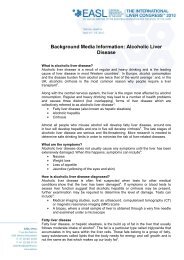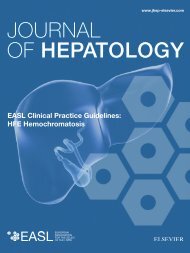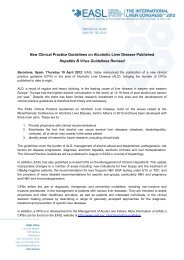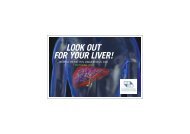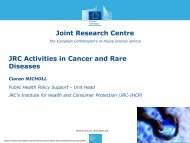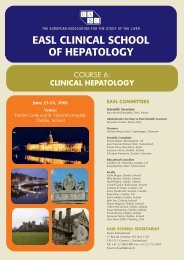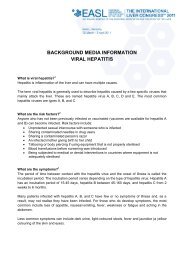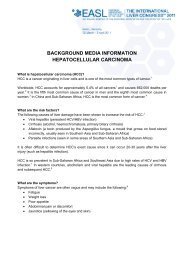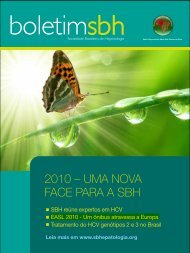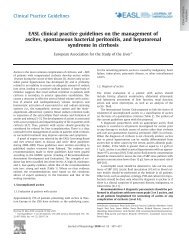barcelona . spain - European Association for the Study of the Liver
barcelona . spain - European Association for the Study of the Liver
barcelona . spain - European Association for the Study of the Liver
You also want an ePaper? Increase the reach of your titles
YUMPU automatically turns print PDFs into web optimized ePapers that Google loves.
BARCELONA . SPAIN<br />
94 POSTGRADUATE COURSE SYLLABUS ALCOHOLIC LIVER DISEASE 95<br />
APRIL 18 - 19/2012 THE INTERNATIONAL LIVER CONGRESS TM 2012<br />
MECHANISMS OF AWS<br />
The pathophysiology <strong>of</strong> AWS is related to <strong>the</strong> effects <strong>of</strong> alcohol upon neurotransmitters in <strong>the</strong> central<br />
nervous system. Prolonged alcohol exposure leads to a down-regulation <strong>of</strong> gamma-aminiobutyric acid<br />
type-A (GABAA) receptors and an up-regulation <strong>of</strong> N-methyl-D-aspartate (NMDA), which leads to <strong>the</strong><br />
development <strong>of</strong> tolerance. During withdrawal <strong>the</strong>re is reduced GABAergic transmission, enhanced NMDA,<br />
glutaminergic and adrenergic transmission and dysregulation <strong>of</strong> dopaminergic transmission. Repeated<br />
detoxification may lead to a ‘kindling’ effect with increased neuronal responsivity and increased severity<br />
<strong>of</strong> AWS and risk <strong>of</strong> seizures. The mainstay <strong>of</strong> treatment <strong>of</strong> AWS remains benzodiazepine <strong>the</strong>rapy. These<br />
drugs enhance GABA activity and counteract adrenergic hyperactivity. The use <strong>of</strong> benzodiazepines also<br />
seems to reduce <strong>the</strong> kindling effect <strong>of</strong> repeated withdrawal.<br />
DRUG THERAPY FOR AWS<br />
On meta-analysis however <strong>the</strong> evidence suggests that benzodiazepines are only better than placebo in<br />
preventing alcohol withdrawal seizures. However <strong>the</strong> quality <strong>of</strong> <strong>the</strong> published trials is sub-optimal and<br />
clinical experience indicates that benzodiazepines have a more generalized beneficial effect in AWS.<br />
For most patients with AWS it is recommended that long-acting benzodiazepines such as diazepam or<br />
chlordiazepoxide are used. These agents allow a smoo<strong>the</strong>r course <strong>of</strong> withdrawal. Diazepam is also more<br />
lipophilic allowing rapid central nervous system distribution, however this feature also leads to re-distribution<br />
to peripheral fat in a less predictable fashion. Both diazepam and chlordiazepoxide require oxidation in <strong>the</strong><br />
liver to produce active metabolites which <strong>the</strong>mselves have long half-lives. This complex metabolism is<br />
impaired in liver disease with reduced hepatic oxidative capacity. Unpredictable metabolism and erratic<br />
drug accumulation can lead to enhanced sedation in patients with significant liver dysfunction.<br />
For this reason lorazepam is preferred in liver disease patients. This shorter acting benzodiazepine<br />
undergoes hepatic glucuronidation which is reasonably well preserved in <strong>the</strong> damaged liver. It is metabolized<br />
to an inactive product. In studies lorazepam has been shown to be equally effective to chlordiazepoxide<br />
in <strong>the</strong> management <strong>of</strong> AWS and is regarded by some s <strong>the</strong> drug <strong>of</strong> choice <strong>for</strong> <strong>the</strong> management <strong>of</strong> alcoholrelated<br />
seizures. In severe cases <strong>of</strong> AWS neuroleptic agents such as haloperidol can be used, ideally in<br />
conjunction with benzodiazepines. Chlorpromazine is best avoided as it lowers <strong>the</strong> seizure threshold. In<br />
patients with severe AWS it is necessary that <strong>the</strong>re is adequate nursing supervision to monitor response to<br />
treatment and to ensure that patients do not become over-sedated and put at risk <strong>of</strong> aspiration pneumonia<br />
amongst o<strong>the</strong>r possible complications. In extreme cases patients may require full general anaes<strong>the</strong>sia in<br />
an intensive care setting to manage <strong>the</strong>ir symptoms.<br />
METHOD OF DRUG ADMINISTRATION<br />
The method <strong>of</strong> administration <strong>of</strong> benzodiazepines in AWS is controversial. Many units adhere to fixed dose<br />
treatment (FDT) regimens with set initial doses <strong>of</strong> treatment and subsequent reductions over a fixed period<br />
<strong>of</strong> time. However symptom-triggered treatment (STT) has been shown to reduce <strong>the</strong> duration and amount<br />
<strong>of</strong> benzodiazepine <strong>the</strong>rapy given <strong>for</strong> AWS. The most commonly used STT instrument is <strong>the</strong> Clinical Institute<br />
<strong>of</strong> Withdrawal Assessment <strong>for</strong> Alcohol (CIWA-Ar). However <strong>the</strong> majority <strong>of</strong> studies investigating STT and<br />
comparing it with FDT have been set in specific alcohol detoxification units. There are few studies assessing<br />
CIWA-Ar in general hospital settings, and those that have frequently exclude patients with complex medical<br />
co-morbidity such as significant liver disease. Whilst an effective tool when used appropriately, <strong>the</strong> CIWA-Ar<br />
is cumbersome and is difficult to administer at <strong>the</strong> appropriate time intervals in a general ward setting. One<br />
study auditing <strong>the</strong> use <strong>of</strong> a CIWA-Ar based STT in clinical practice found that it was initiated inappropriately<br />
in 52% <strong>of</strong> cases. On multivariate analysis <strong>the</strong> presence <strong>of</strong> liver disease was <strong>the</strong> only significant factor<br />
associated with inappropriate treatment.<br />
(Modified) Alcohol Withdrawal Score (GMAWS) which is less time consuming and easier to administer<br />
in a general ward setting (data awaiting publication). However <strong>the</strong>re are exceptions to this approach. In<br />
particular patients with evidence <strong>of</strong> significant liver disease are managed specifically by STT (GMAWS)<br />
with lorazepam.<br />
ALTERNATIVES TO BENZODIAZEPINE THERAPY<br />
Carbemazepine prescribed in a reducing FDT fashion has been shown to be effective in managing AWS in<br />
some studies, however on meta-analysis <strong>the</strong> benefit is questionable and <strong>the</strong>re is no evidence <strong>of</strong> superiority<br />
over benzodiazepines. Gamma-hydroxybutyrate (GHB) may be more effective than placebo in managing<br />
AWS but again does not appear to <strong>of</strong>fer any advantage over benzodiazepines. Bacl<strong>of</strong>en is ano<strong>the</strong>r drug<br />
with potential in <strong>the</strong> management <strong>of</strong> AWS and <strong>the</strong> lack <strong>of</strong> sedating side-effects make this drug especially<br />
appealing in patients with ALD. A greater evidence base is required be<strong>for</strong>e <strong>the</strong>se drugs can be recommended<br />
in <strong>the</strong> routine management <strong>of</strong> AWS.<br />
DIFFERENTIAL DIAGNOSIS<br />
Confusion, disorientation and agitation have a broad differential diagnosis amongst heavy drinking patients<br />
with liver disease. Care must be taken to differentiate between acute alcohol intoxication, intoxication<br />
from o<strong>the</strong>r substances, hepatic encephalopathy, Wernicke’s encephalopathy as well as AWS. A good<br />
clinical history (if obtainable) plus blood alcohol concentration and urine toxicology assessment will help to<br />
differentiate some <strong>of</strong> <strong>the</strong>se presentations. Clinical signs such as asterixis or opthalmoplegia/nystagmus will<br />
also point to an alternative diagnosis. Clearly <strong>the</strong> prescription <strong>of</strong> benzodiazepines to patients with hepatic<br />
encephalopathy may be detrimental and so close observation <strong>of</strong> patients with liver disease treated <strong>for</strong><br />
AWS is essential. Treatment <strong>of</strong> Wernicke’s encephalopathy with intravenous thiamine and correction <strong>of</strong><br />
hypomagnesaemia is generally safe and should be considered in all patients presenting in this fashion.<br />
Figure 1: The FAST Screening Tool<br />
1. MEN: How <strong>of</strong>ten do you have EIGHT or more drinks on one occasion<br />
WOMEN: How <strong>of</strong>ten do you have SIX or more drinks on one occasion<br />
Never<br />
0 Less than monthly 1 Monthly 2 Weekly 3 Daily or almost daily 4<br />
2. How <strong>of</strong>ten during <strong>the</strong> last year have you been unable to remember what happened <strong>the</strong> night<br />
Be<strong>for</strong>e because you had been drinking<br />
Never<br />
0 Less than monthly 1 Monthly 2 Weekly 3 Daily or almost daily 4<br />
3. How <strong>of</strong>ten during <strong>the</strong> last year have you failed to what was normally expected <strong>of</strong> you because <strong>of</strong> drinking<br />
Never<br />
0 Less than monthly 1 Monthly 2 Weekly 3 Daily or almost daily 4<br />
4. In <strong>the</strong> last year has a relative or friend, or a doctor or o<strong>the</strong>r health worker been concerned<br />
about your drinking or suggested you cut down<br />
No<br />
0 Yes, on one occasion 2 Yes, on more than one occasion 4<br />
FAST≥3 indicates hazardous drinking behavior.<br />
In <strong>the</strong> light <strong>of</strong> this we stratified <strong>the</strong> majority <strong>of</strong> AWS patients into those a standard risk <strong>of</strong> severe withdrawal<br />
and those at high risk <strong>of</strong> severe withdrawal. Standard risk patients receive STT, whilst high risk patients<br />
receive FDT plus STT. Risk is assessed by <strong>the</strong> presence <strong>of</strong> high initial symptom score, high FAST score,<br />
history <strong>of</strong> alcohol related seizures and/or severe AWS in <strong>the</strong> past. Instead <strong>of</strong> CIWA-Ar we use <strong>the</strong> Glasgow



